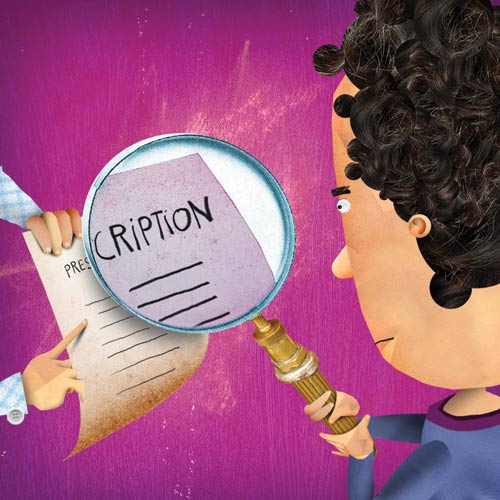After moving to the Midwest from the East Coast, Susana Duarte de Suarez took her ailing 2-month-old daughter, Sofia, to a new pediatrician. During the visit, a nurse came in, asked about her child’s symptoms, then left. Moments later, the physician entered, quickly looked Sofia over, and said, “She’s getting what’s going around.” Within moments—and without a thorough checkup—the pediatrician was halfway out the door to the next appointment.
“I have a few questions,” Susana interjected, stopping the pediatrician in her tracks. “What do I do for her?”
“Give her some Tylenol,” she advised. “She’ll be fine.”
“How much Tylenol do I give her?” the new mother asked.
“What is her body weight?” the doctor said, scanning Sofia’s chart.
“I don’t know—no one in your office weighed her or took her temperature,” she replied. “Will you please pay more attention to this situation and tell me what’s wrong with my daughter? I need information.”
Because Susana spoke up, her daughter got the attention she needed, and Susana got the information and guidance that she, as a paying customer and concerned mother, had a right to expect from the doctor. But not everyone feels comfortable doing that, even if they should.
Being wise medical consumers means choosing medical partners we can communicate with effectively and trust. When it comes to protecting our health, we have to be sure that we are getting what we pay for. An engaged, concerned, and skilled doctor is the best health care investment we can hope to find.

Let’s Talk
Perhaps the most important step to becoming a smart medical consumer is the process of finding and choosing the right GP or family physician. That person will be your closest medical partner and will play an important role in helping you make other decisions about your health care management and practitioners. If you are in the market for a new physician, ask your friends and co-workers for recommendations, and go online to find out what doctors within that specialty are located in your area. When you’ve found one you want to “interview,” call the office and schedule an introductory appointment, so you can go in, share your medical history, and get a sense of the doctor’s attitudes and approach to medicine. (Tell the scheduling assistant specifically what you want to do during the appointment so you have adequate time.)
As with any interview, little things count: The office workers, nurses, and med techs should be friendly and helpful; the office should be clean; the doctor should be open and willing to talk with you about your concerns and interests. Keep it relatively simple, but use your time to determine how well this physician’s working approach suits your own. Does he or she communicate with patients via e-mail when appropriate? Is this doctor comfortable discussing information you’ve gathered? What hospital affiliations does the practice maintain? What regular screening tests does he recommend for someone of your age group? Talk about your major health concerns and listen closely to the answers you receive. If you’re comfortable with the initial meeting, schedule a full physical and use that experience to cement or break the deal with this doc.
Partner with Your Physician
Doctors are not infallible, nor should we expect them to be. Like the rest of us, they occasionally will be distracted and disengaged, and they won’t always seek our active collaboration in the doctor-patient relationship. It is therefore our responsibility to speak up, ask questions, and insist that our voices are heard when we have concerns about our treatment.
We don’t need a degree in medicine to partner with our doctors. We can start with some very simple steps. First, we should realize that our medical history is our business, not just our doctors’ “property.” Most of us know that we should maintain a list of our medications, including dosages and directions for use, along with any alternative health practices and supplements. In addition, many patient advocates advise that we keep track of our medical records, requesting copies from our doctors for our own safekeeping. That way, we know exactly what information is available to new physicians and consulting specialists—and we have the important information we need if we want to do our own research. Further, with copies of our test results in hand, we can be sure that the correct name appears on them and that there wasn’t a mix-up at the lab.
Be Your Own Records Keeper

Every time you visit a new doctor, you’re asked to complete a personal health information form that lists family medical history, your history of diseases, illnesses, injuries, hospitalizations, allergies, and so on. You’re also asked to complete a “release of information” form, which enables your previous doctor to release health records to the new doctor’s office. With all this information floating around, you might wonder why anyone would need to keep his or her own personal health record. But, according to the American Health Information Management Association (AHIMA), everyone should do so. That way, no matter when or where we need health care, the medical provider we consult has access to a full and detailed medical history.
These records can be in written or electronic form, stored in a file folder, on a computer hard drive or disk, on a portable USB removable flash drive, or through an online service. The AHIMA maintains a Web site (My Personal Health Record, myphr.com) that offers full information about the benefits of maintaining a personal health record, along with free downloadable electronic forms for compiling one. The site has a search feature to find forms, tools, and software for storing records. Online services typically have access codes and other measures devised to keep information secure and accessible only by those you’ve authorized. Some online storage services are free, while others charge a monthly fee; check each service carefully when making your choice.
Asking Questions, Getting Answers
At some point, most of us will need a medical advocate—a friend or relative who can accompany us to our appointment or examination to help take notes, ask questions, and listen to information. If our doctor wants to send us on our way with a prescription, we first should ask for the drug’s name, its purpose, side effects, potential negative interaction, and so on. Then, when we fill the prescription, we need to check its accuracy before we leave the pharmacy. And we should always feel free to ask “why”: Why do I need this drug, treatment, or surgery? How else could we tackle this problem? What benefits will I get from this treatment plan, and what risks am I taking?
Some doctors can be prickly when they sense that their authority is being challenged. So how do we help make sure that our physician isn’t misdiagnosing our condition? Jerome Groopman, M.D., recommends that patients or their advocates describe to their doctors exactly what worries them most about their symptoms or condition. And ask early—don’t leave important details until the doctor is leaving the room. Groopman also suggests that patients ask questions to make their doctors think more deeply about their diagnosis, such as “What else could this be?”
We shouldn’t hesitate to speak up about sloppy practices, either. We can—and need to—ask whether all medical instruments, including stethoscopes and blood pressure armbands, have been sterilized, and whether we should be started on antibiotics before surgery, to help ward off post-surgical infections.

Patient-Physician Compatibility?
Through the years, my expectations for physicians have changed. If you’re going to need ongoing service, such as from a cardiologist, dermatologist, internist, or gynecologist, then compatibility is much more important. On the other hand, if you’re seeing a specialist for a (hopefully) one-time treatment, such as an oncologist or surgeon, personality is not as important. What you really want to know is, “How good is the doctor for this type of treatment?” A good question to ask in the first meeting is, “What is your success rate?”
I firmly believe it’s important for patients to be accountable for their bodies and health. We are in a professional relationship with our physicians. We may form close bonds with the health care teams that tend to us or our loved ones, but we can’t afford to overlook potential warning signs simply because we like and trust them. Mistakes happen all the time. Better that we ask why an order has been changed, why a vital sign has been altered, why a medication has been dropped or started, than to have a simple slip-up go unchecked and develop into a fatal error.
Become a Saturday Evening Post member and enjoy unlimited access. Subscribe now



